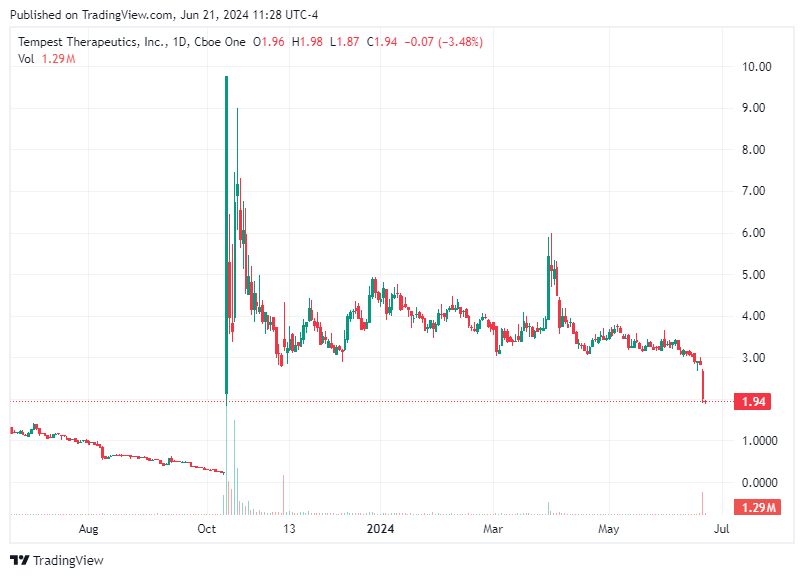Clinical-stage Biotechnology Company Reveals New Data From Amezalpat Study
Tempest Therapeutics to Unveil New Data from Global Randomized Combination Study of Amezalpat (TPST-1120) in First-Line Hepatocellular Carcinoma.
Disclaimer: The following article is a detailed account of the upcoming announcement by Tempest Therapeutics, Inc. regarding their clinical study. It is intended for informational purposes only and does not contain any promotional content or commercial endorsements.
Real-time information is available daily at https://stockregion.net

Tempest Therapeutics, Inc., a clinical-stage biotechnology company listed on Nasdaq under the ticker TPST, is poised to release new data from its global randomized Phase 1b/2 combination study involving amezalpat (TPST-1120) in conjunction with atezolizumab and bevacizumab. This study targets the first-line treatment of hepatocellular carcinoma (HCC). The company has scheduled a premarket press release and a webcasted conference call along with a slide presentation for Thursday, June 20, 2024, at 8:30 a.m. ET.
Background on Tempest Therapeutics
As a clinical-stage biotechnology entity, Tempest Therapeutics focuses on creating innovative therapeutics aimed at combating cancer. The company's portfolio includes small molecule product candidates that are designed to target tumors directly or modify immune responses to enhance anti-cancer effects. The research and development activities span from early exploratory phases to more advanced stages, including randomized global studies involving patients with various types of cancer.
Hepatocellular carcinoma (HCC) is the most common type of primary liver cancer, representing a major health concern worldwide. It typically occurs in individuals with chronic liver diseases such as cirrhosis caused by hepatitis B or C infection or heavy alcohol consumption. First-line treatment options for HCC have traditionally included surgical resection, liver transplantation, and locoregional therapies; however, systemic therapies have gained prominence in recent years, particularly for patients who are not candidates for surgery. The study undertaken by Tempest Therapeutics involves amezalpat (TPST-1120), a novel therapeutic agent, combined with atezolizumab and bevacizumab. Atezolizumab is an immune checkpoint inhibitor, while bevacizumab is an anti-angiogenic drug known to inhibit the formation of blood vessels that supply nutrients to tumors. The combination of these agents aims to provide a synergistic effect, potentially improving patient outcomes by targeting the cancer through multiple mechanisms.
The Phase 1b/2 study is designed as a global randomized trial, enrolling patients from various geographic regions to assess the safety and efficacy of the combination therapy. The primary focus is on first-line treatment for patients diagnosed with HCC who have not received prior systemic therapy. The study's endpoints include overall survival, progression-free survival, and objective response rate, among other clinically relevant measures.
Methodology and Patient Enrollment
The methodology of the study involves a rigorous randomization process to ensure that patients receive either the combination therapy or a comparator regimen in a manner that minimizes bias. Eligible patients undergo thorough screening to confirm their diagnosis and suitability for inclusion in the trial. Once enrolled, patients receive regular assessments to monitor their response to the therapy, as well as any potential side effects. Patients are stratified based on various factors such as disease stage, underlying liver function, and previous treatments received. This stratification helps in understanding how different subsets of patients respond to the therapy, providing valuable insights into its efficacy across diverse populations.
The new data expected to be reported by Tempest Therapeutics may shed light on key aspects of the combination therapy's effectiveness against HCC. These include:
Safety Profile: Detailed analysis of adverse events and overall tolerability of the combination therapy.
Efficacy Measures: Evaluation of how well the therapy controls tumor growth, prolongs survival, and improves quality of life for patients.
Biomarker Analysis: Identification of biomarkers that may predict response to treatment, aiding in the personalization of therapy for future patients.
The data generated from this study could potentially lead to advancements in the standard of care for HCC, offering new hope for patients with limited treatment options. It may pave the way for further research into combination therapies that leverage both immune modulation and direct tumor targeting. Tempest Therapeutics has planned a webcasted conference call and slide presentation to discuss the new data in detail. This event will provide an opportunity for stakeholders, including healthcare professionals, researchers, and investors, to gain a deeper understanding of the study findings. The company's leadership team will present the data, answer questions, and outline the next steps in the development and potential regulatory approval of amezalpat (TPST-1120).
The upcoming announcement by Tempest Therapeutics represents a crucial moment in the ongoing efforts to develop effective treatments for hepatocellular carcinoma. The combination study of amezalpat (TPST-1120) with atezolizumab and bevacizumab holds promise for enhancing patient outcomes through innovative therapeutic strategies. As the company prepares to share its findings, the medical community and patients alike await the potential benefits that this research may bring.
Disclaimer: The information provided in this article is intended for educational and informational purposes only. It should not be construed as professional advice or an endorsement of any specific product or therapy. Always consult with a qualified healthcare provider for medical advice and treatment options.
Real-time information is available daily at https://stockregion.net

